2019- 2020 Cohort
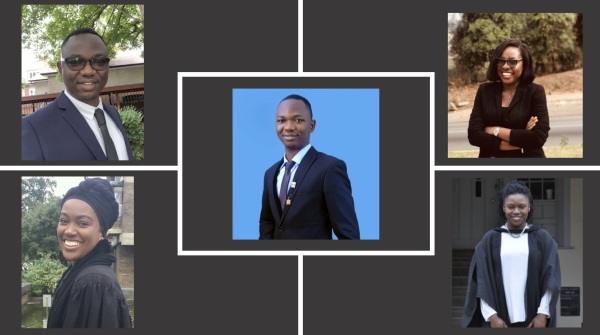
These are photos of the fourth cohort of PhD students sponsored by Cambridge-Africa when they started in the academic year 2018/2019.
Starting from top left: Edward, Peace, Lyn, Iyeyinka and Tochukwu (centre)
Find out what they are up to below:
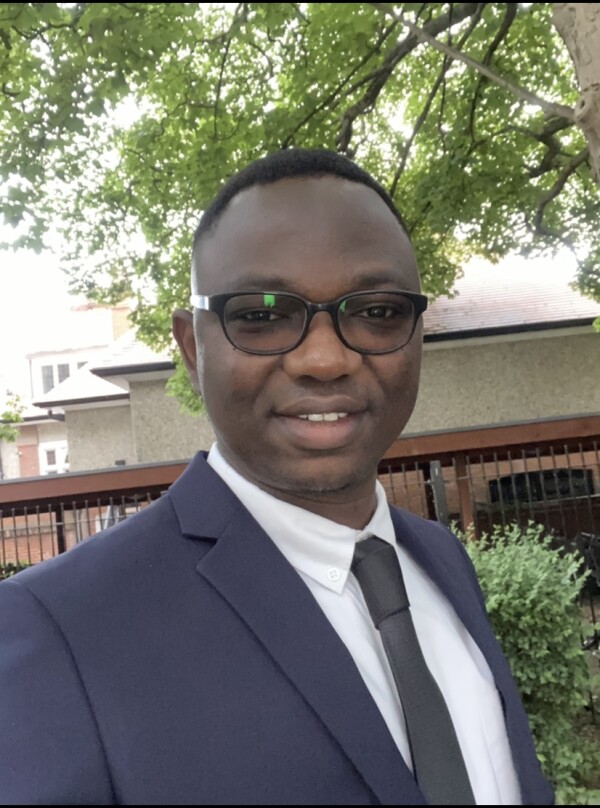
Dr Tochukwu Nweze
| Full name | Tochukwu Ejiofor Nweze |
| PhD project | Developmental burden of childhood adversity: Insight from longitudinal perspectives |
| PhD Supervisor (Department) | Prof Rogier Kievit |
| Year of completion | 2022 |
| ejiofortochukwunweze@gmail.com |
WHERE ARE YOU AT THE MOMENT? |
|
|
I resumed my duty as a lecturer at University of Nigeria, Nsukka where I lead and collaborate research with other academics. I also mentor high school students in conducting research projects and publishing their papers. |
|
TELL US ABOUT YOUR TIME AT THE UNIVERSITY OF CAMBRIDGE |
|
|
Cambridge University is reputed for its strong academic and research excellence and since my time at undergraduate program at Nnamdi Azikiwe University, I have always wished that one day, I could study at this prestigious institution. I did my masters’ program in Neuroimaging at King’s College London and our cohort toured one of the MRC units at University of Cambridge where we visited some amazing research facilities including some MEG and MRI facilities. My master’s project supervisor at King’s who also studied at the same department in Cambridge University, had very nice memories of the institution. Prior to my PhD program, I had conducted research on the adversity exposed children, including institutionalised children both during my masters program at King’s and as a lecturer at University of Nigeria. In applying to a PhD place at University of Cambridge, I wanted to build on this research knowledge. I was very delighted and indeed, a dream come true, when I received the admission and funding offer to study at Cambridge. My Cambridge experience started very great and my research progressed quite well. However, mid-way through my first year, my supervisor left the United Kingdom and covid unexpectedly struck, affecting so many academic and social life. This meant that I had to complete the remaining part of my PhD, working from home and without a formal supervisor. Fortunately, I was able to form collaboration with other academics outside Cambridge, such as Dr Jamie Hanson who provided me with feedback on my projects and assisted as I published all my thesis chapters in academic journals. Although our ability to gather for social events was restricted for much of the time I spent at the University, support provided by different societies helped ensure survival. I enjoyed playing regular tennis with members of the University and College (St Edmund’s) tennis clubs, and also cherished the social meetings with members of African Society of Cambridge University and Cambridge African scholars etc. |
|
TELL US ABOUT YOUR EXPERIENCE SINCE LEAVING THE UNIVERSITY OF CAMBRIDGE |
|
|
|
ALUMNI WISDOM (what can you tell current Cambridge-Africa PhD scholars) |
|
|
|
Publications |
|
|
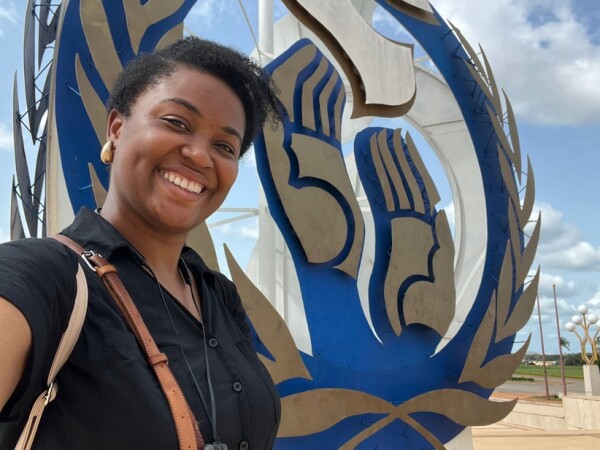
Dr Lyn Kouadio
| Full name | Lyn Joanne-Victoire Kouadio |
| PhD project | On the Politics of Africanising Transitional Justice |
| PhD Supervisor (Department) |
Prof Adam Branch, Politics and International Studies (POLIS) |
| Year of completion | 2023 |
| lyn.kouadio@univ.ox.ac.uk |
WHERE ARE YOU AT THE MOMENT? |
|
|
I started a postdoctoral fellowship at University College Oxford in October 2023 and passed my viva in November 2023. I am also a Research Associate at the Félix Houphouët-Boigny Foundation in Côte d’Ivoire. |
|
TELL US ABOUT YOUR TIME AT THE UNIVERSITY OF CAMBRIDGE |
|
|
I will forever remember my time at Cambridge fondly because of the amazing people who made my time there, first during my MPhil and then during the PhD, exceptional. I was very fortunate to have a solid group of friends who modelled strength, resilience, kindness, intellectual creativity and brilliance to me. They did so much grace. It was a privilege to share Cambridge's beautiful space, marked most notably by its many well-resourced libraries, with and surrounded by such brilliant people. The wonderful people I met and befriended, who, over time, became my people, are those I credit the most for how much I grew throughout the doctoral journey without becoming worn or ground down. I also thank them for helping me ground and sharpen my intellectual pursuits and for helping me remember why I pursued doctoral studies in the first place and why I decided to opt for a career in academia. |
|
TELL US ABOUT YOUR EXPERIENCE SINCE LEAVING THE UNIVERSITY OF CAMBRIDGE |
|
|
|
ALUMNI WISDOM (what can you tell current Cambridge-Africa PhD scholars) |
|
|
|
PublicationsOn the Coloniality of News Mobilities and How the World Knows About What Happens in Black Francophone Africa.” Contemporary Journal of African Studies (Forthcoming) “A Black African Francophone’s Reflections on the Coloniality of Knowledge Production in an Anglo-American Academic World.” Program in African Social Research (Forthcoming) “The Ivorian 2011-2013 Truth Commission as a Practice of Securitising Truth” in Documentation from Truth and Reconciliation Commissions edited by Proscovia Svärd and Bonny Ibhawoh (2024) “Zouglou Visions of Transitional Justice.” International Journal of Transitional Justice (2022). Academic Work in Progress “Navigating Plural Coloniality: Reflections on the Making of Black Afro-Francophone Higher Education in an Anglo-American Academic World” (Under review with International Political Sociology) “Decolonicide: On a Practice of Erasure and Obfuscation” (Under review with African Affairs) “Africanising Transitional Justice” (Book manuscript in preparation) “The RDA: A Political History” (Book manuscript in preparation) Other Publications “The Affective Politics of AFCON” Africa is a Country, 14th March 2024 https://africasacountry.com/2024/03/the-affective-politics-of-afcon |
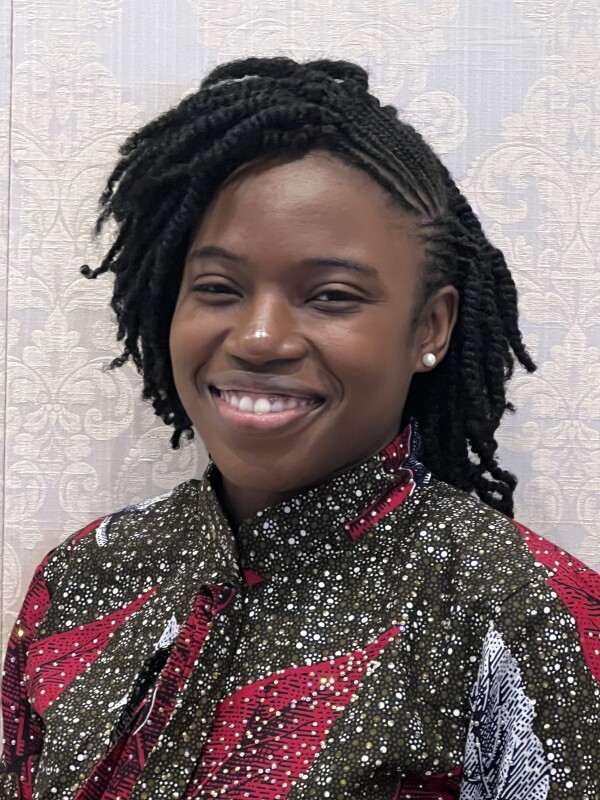
Dr Iyeyinka AnuOluwahan Kusi-Mensah
|
Full name |
Iyeyinka AnuOluwahan Kusi-Mensah |
|
Department |
Department of Sociology |
|
PhD supervisor |
Professor Brendan Burchell |
|
Title of PhD thesis |
Social Networks, Social Support and the Working Lives of Self-Employed Young People in Ghana and Nigeria |
|
Year of completion |
2024 |
|
Current place of employment |
College of Medicine, University of Ibadan |
|
Position at place of employment |
Post-Doctoral Fellow |
|
Email address |
iyejpt@gmail.com |
Where are you at the moment? |
|
I currently live and work between Ghana and Nigeria where I am continuing the research which I started during my PhD on youth employment and wellbeing. I am currently a post-doctoral fellow at the College of Medicine, University of Ibadan, Nigeria on some projects focused on youth employment and wellbeing. |
Tell us about your time at the University |
|
When I finished secondary school, I remember being unsure about what subject I would like to pursue at university. Hence, I was very fortunate when I received a scholarship from Harvard University to pursue my undergraduate studies. Harvard adopts a liberal arts approach to undergraduate education, so I was able to explore a range of academic subjects. When I had to declare a course of study, I decided on Social Anthropology and African Studies because I enjoyed the critical approach of these subjects to understanding society. At the end of my undergraduate studies, I had a strong interest in pursuing academia, but my teachers encouraged me to delay starting post-graduate studies immediately and see the world which turned out to be excellent advice. During this period, I pursued a travelling fellowship in Guadeloupe where I developed English educational materials for Francophone children. Also, I taught mathematics to secondary school students in Ibadan, Nigeria. I loved teaching but by this time, I was also confident that I wanted to do research on how to harness the potential of young people in Africa. I decided to apply for an MPhil in Sociology at the University of Cambridge with the goal of pursuing research on how to improve employment opportunities for young people in Africa. The freedom I had to pursue my research interests at Cambridge was a real treat. I was able to take courses on a range of research methodologies from survey design to text mining and learn about different programming languages including Stata, R and Python. I enjoyed attending a range of seminars including on topics far off from my core research area in youth employment and wellbeing. I learnt a lot in reading groups I belonged to especially the Individual in the Labour Market Reading Group (ILMRG) and from my supervisor, Prof Brendan Burchell, who encouraged me to critically search for knowledge. Outside of my academics, I served on the board and eventually as President of the African Society of Cambridge University (ASCU). ASCU was a community I loved being a part of because it gave me a flavour of home in Cambridge. We worked hard to fundraise and plan the annual Africa Together Conference on the theme “Investing in Young People: Building Africa’s Human Capital and Future” which unfortunately got cancelled because of the COVID-19 Pandemic. I was also active in my church community and I am grateful for the growth I experienced in my faith during my time at Cambridge. I think the highlight though of my PhD years was giving birth to my daughter. When I got pregnant, I worried somewhat about how it would affect my ability to complete my PhD. However, I received a lot of support from my husband, family, my supervisor, my college and the Cambridge-Africa scholarship. It turned out fine and my daughter enriched the writing up process. |
Tell us about your experiences since leaving the University |
|
In January 2022, the International Development Research Centre (IDRC) launched a call for grants to promote women’s health and economic empowerment in the aftermath of the COVID-19 pandemic. At this time, I had recently returned to Cambridge to complete writing my dissertation following fieldwork in Ghana and Nigeria where I had collected data on the social networks and job quality of self-employed youth. Some aspects of my data had also focused specifically on the impact of the COVID-19 pandemic on self-employed youth. Aware that I had collected data on the impact of the pandemic, Olayinka Omigbodun, Professor of Psychiatry at the College of Medicine, University of Ibadan reached out to me about whether I would be interested in joining a research team putting together a proposal in response to the IDRC call. I immediately jumped at the opportunity because it aligned perfectly with my research interests at the intersection of youth employment and wellbeing. The preliminary data I had collected during my PhD was used to develop a proposal titled ““Understanding the Gendered Impact of COVID-19 on Young Self-Employed Nigerian Women and Co-Producing Solutions that Foster Better Systems and Wellbeing.” Our research team was awarded the grant by the IDRC and I came onboard the project as the Lead Post-Doctoral Fellow. Since I submitted my PhD, I have been working full-time on this project which has been branded as “Advancing Resiliency in Self-Employed young Women in Nigeria (ARISE&WIN)” (ariseandwin.ng). It has been gratifying to be able to build upon my PhD work and co-produce interventions with self-employed young women in Oyo State, Nigeria to improve their resilience against significant disruptive life events and promote their work and wellbeing. I am also a post-doctoral fellow on the “Utilizing Mathematical Modeling to tackle Depression & Related Mental Health Conditions Among Adolescent Girls & Young Women in Sub-Saharan Africa.” Through my work on these projects, I have developed new skills in methodologies such as systematic reviews, policy analysis, knowledge translation, quantitative analysis as well as in research project management. I am also glad to be able to participate in projects where I can see the real word impact of the research I am conducting. |
Alumni wisdomIf you could offer a piece of advice, a tip or simply some words of encouragement to those who have travelled from their home countries in Africa to undertake their PhD at the University of Cambridge, what would it be? |
|
I remember feeling lonely my first few weeks in Cambridge. I had nagging thoughts about whether I belonged here. I felt a bit intimated because everyone seemed so knowledgeable and accomplished. If I could go back, I would tell myself to be patient. I would tell myself that I would eventually find “my people” from Africa and other parts of the world who would enrich me in so many ways. I would tell myself that I have so much to offer and I shouldn’t be afraid to speak up. I would tell myself to enjoy the journey because it goes by so quickly. |
Publications |
|
|
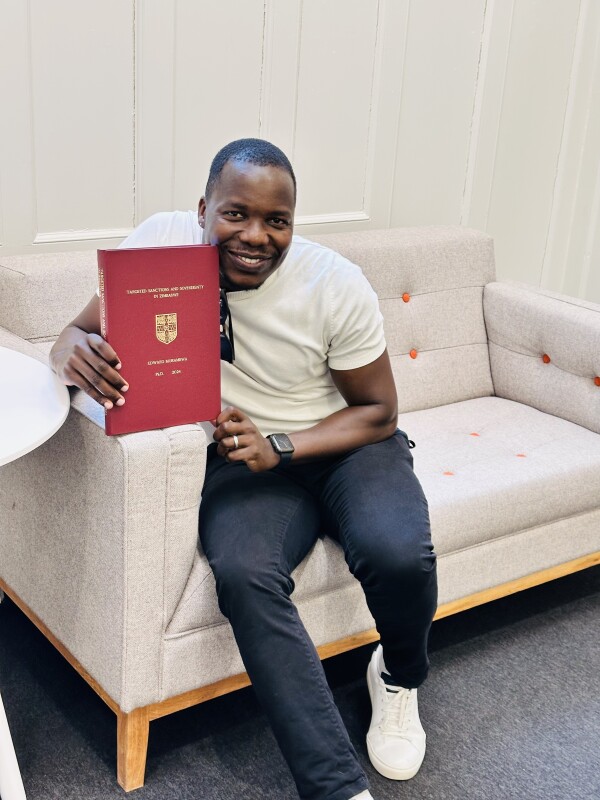
Dr Edward Murambwa
| Full name | Edward Murambwa |
| PhD project | Department of Politics and International Studies |
| PhD Supervisor (Department) | Prof. Lawrence Hamilton |
| Year of completion | 2024 |
WHERE ARE YOU AT THE MOMENT? |
||
|
I recently got engaged in Sydney in January 2025, and if all goes well, I’ll be getting married next year. In addition to going to the gym and staying fit, I’ve also developed a passion for baking—especially bread, which I’ve really come to enjoy. |
||
TELL US ABOUT YOUR TIME AT THE UNIVERSITY OF CAMBRIDGE |
||
|
During my MA at the University of the Witwatersrand in Johannesburg, my research focused on the institution of private property. It was through this research that I developed a keen interest in the area of targeted sanctions. What began as a project aimed at advocating for the effectiveness of such measures gradually evolved into a critical examination of their unintended consequences. My findings revealed that targeted sanctions often fall short of their stated objectives and, in some cases, may even prove counterproductive by exacerbating the very conditions they aim to address. Pursuing further studies at the University of Cambridge has undoubtedly been one of the most enriching and transformative experiences of my life. I had applied to both Cambridge and Oxford and ultimately found myself in this remarkable city. Cambridge, with its unique collegiate structure and deeply rooted academic traditions, offered an intellectually stimulating and supportive environment. The formal dinners—an enduring Cambridge tradition—became not just social events, but also vibrant forums for interdisciplinary exchange. It was not uncommon to find oneself seated next to a scientist, a historian, or a linguist, and yet always leave with new insights and perspectives. While my time at Cambridge has been deeply rewarding, it has not been without its challenges. Like any meaningful journey, it has included moments of difficulty and unexpected detours. Yet, what stands out most for me are the enduring friendships and meaningful connections I have formed within this extraordinary community. These relationships have enriched my personal and academic life, and they are something I will carry with me wherever my journey leads. |
||
TELL US ABOUT YOUR EXPERIENCE SINCE LEAVING THE UNIVERSITY OF CAMBRIDGE |
||
| Since completing my viva in June 2024, I have spent some time in Zimbabwe, as well as a brief period in Australia. At present, I am working on several publications. Following strong recommendations from my examiners, I am also seriously considering developing my thesis into a monograph. | ||
ALUMNI WISDOM (what can you tell current Cambridge-Africa PhD scholars) |
||
|
||
Publications |
||

